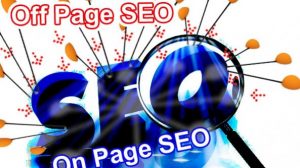This article will focus on detailed explanation of On Page vs Off Page SEO and how does it affect search engine rankings.
The internet today is all about making your presence felt before anyone else takes the cake. Surely one can spend money to achieve better visibility through paid advertising.
But how good would the icing taste be if the cake comes for free? This is where SEO (Search Engine Optimization) steps in. SEO is the process where the visibility of a webpage is increased through unpaid or ‘natural’ processes. There are two types of SEO ‘methods’.
We take a look the effectiveness On-page vs. Off-page SEO methods.
What is On-page SEO?
For On-page SEO, as the name suggests, the specific webpage whose visibility has to be increased when a user searches for a result, is alleviated by directly optimizing the webpage containing that result.
This optimization is performed by directly working on the .html file of the webpage through html tags. This mode is also called “invisible” optimization. This technique consists articulating the webpage with keywords, ALT tabs, H1 tags and links. Better keyword density and updated information play a vital role in fetching search results.
Keywords embedded in the domain name or other highly important On-page SEO techniques.
What is Off-page SEO?
Whenever the issue of on-page vs. off-page SEO has been raised, a lot of people have claimed that a greater part of the work is done behind the scenes. In off-page SEO, all of the optimization is done away from the website. This kind of optimization gained popularity due to the PageRank algorithm developed by Google.
However, other techniques involved in it such as anchor links were in use and discussion since decades. The functioning is explained as the links to the related keywords are linked or anchored from higher ranking websites, preferably from well-established authority sites, which of course lie outside the website aimed at housing the search result.
The Off-page SEO checklist should contain deep linking, one-way hyperlinks and a target of as much as 500 keywords for best results on search engines.
On-page vs. Off-page SEO
If it comes to actually compare On-page vs. Off-page SEO, people would definitely choose the latter. The Internet has grown both in size as well as complexity.
Now it is very easy to manipulate the On-page optimizations carried out. Moreover, Off-page optimization gives the user total control of how the internet should portray his/her website.
But for basic uses, On-page SEO suffices. As On-page SEO employs html, it is advantageous in certain cases as html is the easiest for search spiders to read and analyze.
Off-page optimization is beneficial for relatively new websites, rather than old websites with a deep structure.
In the end, it all depends on how quickly hits are needed by the site owner.
Both sides in the battles of SEO techniques have their points to debate. It does not matter which way the battle of On-Page Vs Off page SEO goes, the conclusion is the same, search engine optimization is the way to go today. You can either hire a specialist in paid SEO techniques or try to optimize your website yourself free of cost. Armed with this knowledge, you can make your website an outright winner.

